Il Generale della Rovere Blu-ray Movie
HomeIl Generale della Rovere Blu-ray Movie 
Director's Cut | Includes theatrical cut in SDRaroVideo U.S. | 1959 | 140 min | Not rated | Dec 03, 2013
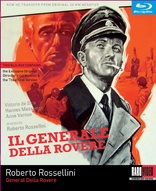
Movie rating
7.2 | / 10 |
Blu-ray rating
| Users | 0.0 | |
| Reviewer | 4.0 | |
| Overall | 4.0 |
Overview
Il Generale della Rovere (1959)
In Genoa in 1943, Emanuele Bardone is a rascal and swindler pretending to be a colonel in the Italian army in order to extort money from the families of people jailed by the Nazis. Once caught, the Gestapo bargain with him: he will stay alive if he agrees to impersonate Generale Della Rovere, a leader of the Resistance who the Nazis have just shot. They propose to put him in a political prison where he will then identify another Resistance leader.
Starring: Vittorio De Sica, Hannes Messemer, Sandra Milo, Giovanna Ralli, Anne VernonDirector: Roberto Rossellini (I)
| Foreign | Uncertain |
| Drama | Uncertain |
| War | Uncertain |
Specifications
Video
Video codec: MPEG-4 AVC
Video resolution: 1080p
Aspect ratio: 1.37:1
Original aspect ratio: 1.85:1
Audio
Italian: DTS-HD Master Audio Mono
Subtitles
English
Discs
50GB Blu-ray Disc
Single disc (1 BD)
Playback
Region A, B (C untested)
Review
Rating summary
| Movie | 4.0 | |
| Video | 4.0 | |
| Audio | 4.0 | |
| Extras | 4.0 | |
| Overall | 4.0 |
Il Generale della Rovere Blu-ray Movie Review
An actor playing a character playing a role.
Reviewed by Casey Broadwater November 21, 2013By 1959, a decade and change after he made his name with the neorealist war movies Rome, Open City and Paisan, Roberto Rossellini
was in both a creative peak and a commercial slump. His five domestic Euro-dramas with star-turned-mistress-turned-wife Ingrid Bergman were
compelling but nonetheless box office failures, and he had just returned from India after simultaneously shooting a breathtaking 10-part documentary
miniseries and a still underseen narrative film, India Matri Buhmi. As the director's one-time assistant and protege François Truffaut put it—in
his essay, "Roberto Rossellini Prefers Real Life"—"In the end, Rossellini's work is accepted by the public and the critics only when it is about the war."
As an illustration, Truffaut offers Il Generale della Rovere, Rossellini's "only recent success," which won the Golden Lion prize at the 1959
Venice
Film Festival. Superficially, the film would appear to be Rossellini's return to his neorealist roots—it's set during the war, and it even stars fellow
neorealist Vittorio De Sica, director of Bicycle Thieves—but on closer examination, Il Generale della Rovere knowingly embraces a
heightened sense of artificiality in a sly commentary on how fictions can be just as powerful as truths.

Charmer
In perhaps his best role—and one of his few dramatic roles, as he was often typecast in comedies—De Sica plays Emanuele Bardone, a charming conman in war-torn, German-occupied Genoa. Bardone's particular racket is in convincing the wealthy wives and mothers of Italian P.O.W.s and imprisoned resistance fighters that he has the connections necessary to get their husbands and sons out of jail, or at the very least smuggle in some salami or other foodstuffs. To earn the trust of these women, he poses as "Colonel Grimaldi"—a stripe-wearing veteran—and then fleeces them for all they're worth, gambling their money away and chowing down on the meats in the care packages they've put together for him to deliver. (The gambling is a not-so-subtle nod to De Sica's own admitted gambling addiction, the first of several self-referential gags.)
Bardone is an exploitive shyster who tries to justify his actions—once he's finally caught—by claiming that he was giving the women hope in their dire circumstances. That is, essentially doing a wartime social service. Do we believe him? Not at all. He's a lout, but at the same time—and this has a lot to do with De Sica's avuncular humor—we begrudgingly like him. He's enthusiastic. Oddly well-mannered. A hard-working hustler. (Watch as he spends an entire sequence trying to sell a worthless fake sapphire for 50,000-100,000 lira.) And we know from the outset that he's primed for eventual redemption. One of Rossellini's key themes throughout the 1950s was post-war morality, after all, and in Bardone, we have a character who comes to represent mankind's best and worst instincts.
The film's first half observes Bardone's slick chicaneries, but the more interesting developments occur in the second half. "Grimaldi" is convicted of fraud, and SS Colonel Müller, an officer who takes a liking to him—efficiently played by The Great Escape's Hannes Messemer, an actual former German commander—offers Bardone an ultimatum. He can either face near-certain execution or he can win his freedom by entering a jail in Milan for political prisoners, impersonating the dead Italian freedom fighter General della Rovere, and ferreting out information about the resistance movement from his fellow inmates. Inside, while putting on a front as "Rovere"—and faced with all the moral queasiness that comes along with spying on his countrymen—Bardone's own character is gradually ennobled.
In the most memorable scene, allied bombers raze the city outside the prison, causing the inmates to shout in fear to be released. Bardone, assuming his Rovere role with sudden authority, orders his "men" to be strong and brave before collapsing in his own cell, crossing himself in pious terror. He's not unlike Les Misérables' Jean Valjean—both are former convicts who go by aliases and strive to do right in order to overcome their criminal pasts.
Il Generale della Rovere lacks the rawness and verité of Rossellini's earlier, better-known works, and in many ways it's one of his most conventional, uncomplicated films, with a clear moral dilemma and a character who betters himself in a predictable way. (Which may explain the film's commercial, populist success. Films like Rome, Open City and Paisan—and most of what we'd now call the neorealist classics—were initially criticized for being too baldly confrontational about Italy's social problems when post-war moviegoers just wanted optimistic escape. Politician Giulio Andreotti famously described the movement as "dirty laundry that shouldn’t be washed and hung out to dry in the open.") In fact, Rossellini considered himself something of a hired gun here, agreeing to direct the story—written by Sergio Amidei, based on an Indro Montenelli novel—with a limited budget and resources, requiring him to shoot primarily on studio soundstages instead of on-location. And yet, he intentionally plays up the artificiality of these sets, uses extensive rear-projection for scenes that should've been shot outside, and then inserts vintage newsreel documentary footage from the war, blending the obviously fake and the obviously real with all the aesthetic friction you'd expect from this kind of juxtaposition. The style mirrors the content of Bardone's character—does a falsehood really matter if it arrives at something true?
Il Generale della Rovere Blu-ray Movie, Video Quality 
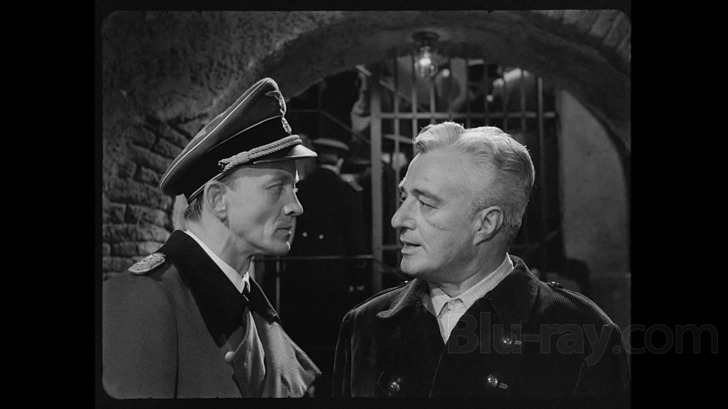
When the Criterion Collection's DVD of Il Generale della Rovere suddenly went out of print not too long ago, it was sure sign that another
distributor
had picked up the release rights. That distributor was RaroVideo, and their Blu-ray release, billed as a "new HD transfer from original 35mm negative,"
may be divisive because of how Raro has opted to matte the film. Or not matte it, rather. To preserve all of the image captured in-
camera, Raro has windowboxed the 1.37:1 frame—including the rounded corners of the film gate—inside a 1.78:1 container, leaving some black space on
the top and bottom along with the black bars you'd expect on the sides of the frame. Criterion's DVD was windowboxed too, it should be noted,
and it was also slightly cropped to remove the round corners, losing some detail from all four sides of the picture in the process. Raro's transfer,
then, is a more complete reproduction of the 1.37:1 image captured on the original negative, but there might be some who argue that the film
should be presented on video as it was most likely projected in European theaters—in 1.66:1.
It's a question of both directorial intent and viewer preference, and opinions are sure to be varied. (You could even argue that presenting the image
rounded-corners-and-all, which suggests the artifice of moviemaking, is appropriate to the film's themes of truth and fiction at odds and at one.) Sticking
with what can be objectively described, however, Raro's high definition presentation of the film has more pros than cons. The level of detail, as you'd
hope, has been greatly improved from Criterion's standard definition edition, with finer textures visible not only in the actors' faces and clothing, but also
in the film's 35mm grain structure, which is unhindered here by any digital noise reduction or other filtering. The image's grayscale has been balanced
nicely as well—with no crushed shadows or blown out highlights—and print damage is limited to small specks and the occasional hairs stuck to the edge of
the gate.
The only oddity in this "Director's Cut" remaster is that the scenes not present (or not fully present) in the theatrical version come from a
different source—a safety positive—that's significantly lower in quality. Contrast is flatter, grain is much heavier, and there are some strange digital-
looking pulsations in four or five of the prison scenes, where macroblocking is visible in the background grain patterns. In the supplementary materials,
restoration specialist Aldo Strappini describes the difficult work entailed in getting these two sources to match as closely as possible—including a good deal
of digital repair work—so it's likely that not much more could be done here. Overall, though, if you can get past the framing and the noticeable dips in
appearance during the six minutes of director's cut material, Il Generale della Rovere is a pleasure to watch on Blu-ray.
Il Generale della Rovere Blu-ray Movie, Audio Quality 
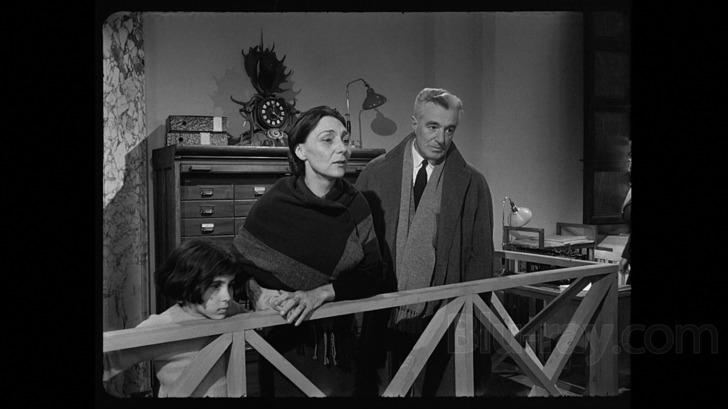
Less controversial is the disc's lossless DTS-HD Master Audio 2.0 mono track, which—barring an occasional low-level, barely noticeable hiss—is entirely free from distractions or quality issues. The Italian and German dialogue is clear and well-balanced, and the foreboding score from Rossellini's brother, Renzo—who scored many of the director's films, including Paisan, Germany Year Zero, and Rome, Open City—sounds wonderful. The disc includes optional English subtitles, which appear in easy-to-read white lettering.
Il Generale della Rovere Blu-ray Movie, Special Features and Extras 
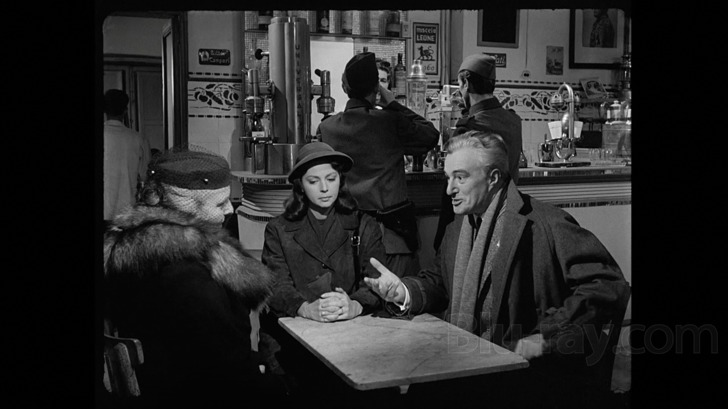
- Il Generale Della Rovere: Theatrical Version (SD, 2:12:04):
- The Truth of Fiction: A Visual Essay by Adriano Aprà (SD, 45:21): Centered around an extensive interview with Rossallini's son, Renzo Rossallini Jr., this visual essay—put together and narrated by film critic Adriano Aprà—covers the creation of the film, Vittorio de Sica's involvement, the acting, and the story's themes of dualism, fact, and fiction.
- Interview with Renzo Rossellini Jr. (SD, 32:08): A bit redundant, but here you'll find the complete, unedited version of the above interview with Renzo Rossellini.
- Interview with Adriano Aprà (SD, 40:00): Aprà focuses here on the differences between the director's cut that played at the Venice Film Festival and the subsequent, shorter theatrical release.
- Interview with Aldo Strappini (SD, 9:50): Strappini, who oversaw the film's high definition restoration—which Criterion also used for their out-of-print DVD release—discusses the process of inserting the material from the director's cut, which came from a safety positive print, into the shorter version, prepared from the original negative. A must-watch for those interested in how older films are repaired and remastered.
- Original Trailer (SD, 2:02)
Il Generale della Rovere Blu-ray Movie, Overall Score and Recommendation 
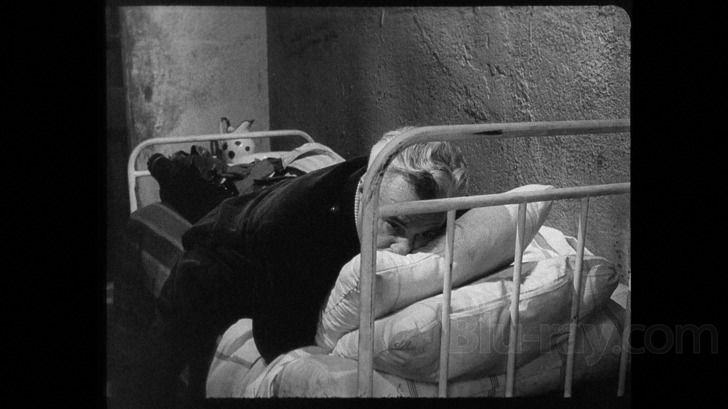
Though dealing with the same subject matter of his earlier, neorealist films, Roberto Rossellini's Il Generale della Rovere embraces an intentional blending of artifice and reality, with soundstage sets, rear projection sequences, and repurposed newsreel footage from the war, all of which works together to to complement the story's theme of truth and fiction in conflict. Anchoring the film is a rascally charming—and, ultimately, moving— performance from Rossellini's former neorealist compatriot actor/filmmaker Vittorio de Sica (Bicycle Thieves), in one of his best roles. RaroVideo's high definition presentation may prove controversial to some—because of its windowboxed framing—but it easily bests Criterion's now-out-of-print DVD. Additionally, the disc includes nearly two hours of supplementary material, including interviews and a thoughtful video essay. Recommended!
Similar titles
Similar titles you might also like

Rome, Open City
Roma città aperta
1945

Amen.
Der Stellvertreter
2002

Tommaso
2019

Ashes and Diamonds
Popiól i diament
1958

Paisan
Paisà / Original Release Version
1946

Sophie Scholl: The Final Days
Sophie Scholl: Die letzten Tage | 4K Restoration
2005

Shoeshine 4K
Sciuscià
1946

Mamma Roma
1962

Accattone
1961

A Hidden Life
2019

Bicycle Thieves
Ladri di biciclette
1948

Army of Shadows
L'armée des ombres / Better encode than 2011 release
1969

The Club
El Club
2015

Corpus Christi
Boże Ciało
2019

Yesterday, Today and Tomorrow
Ieri, oggi, domani
1963

Two Women
La Ciociara
1960

Vagabond
Sans toit ni loi
1985

The Painted Bird
Nabarvené ptáce / Slipcover in Original Pressing
2019

I Vitelloni
1953

The Burmese Harp 4K
ビルマの竪琴 / Biruma no tategoto
1956